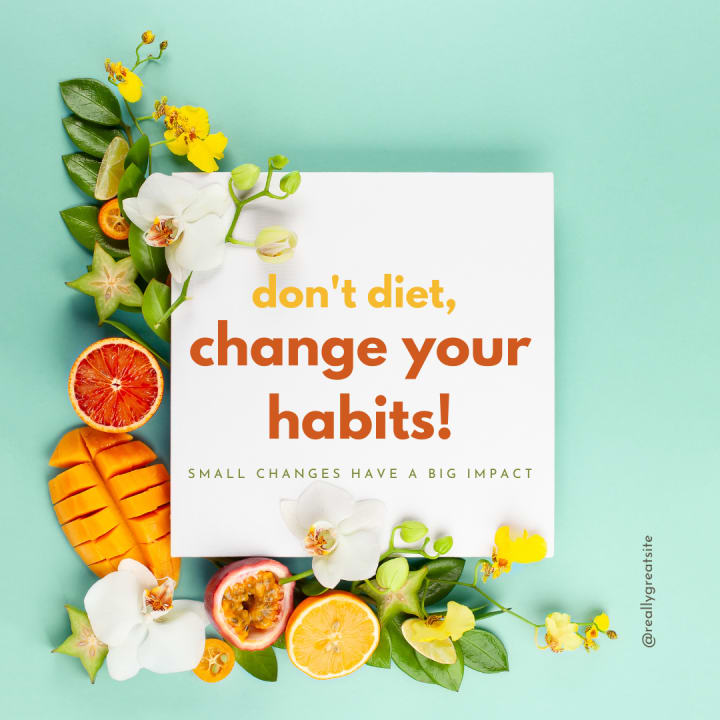Decreasing Cortisol Levels, Naturally
Discover natural ways through food that can help lower cortisol levels, the hormone associated with stress.

This discussion will explore foods that can help decrease cortisol levels naturally. While managing stress involves various practices such as maintaining a healthy work-life balance, setting boundaries, getting adequate sleep, and exercising, changing your diet can also significantly impact stress levels. This is because what you eat affects cortisol levels. Cortisol is the stress hormone that triggers the fight or flight response and is vital in regulating sleep, inflammation, blood pressure, and blood sugar levels.
Let Food Be Thy Medicine.
Although cortisol is helpful in the short term, prolonged exposure to it can lead to chronic stress, which can contribute to several health issues, including anxiety, depression, fatigue, inflammation, weight gain, high blood pressure, decreased immune system, and higher chances of diabetes and heart disease. Reducing cortisol levels can, therefore, significantly impact both physical and mental health.
Studies have shown that people on a traditional American diet high in fat, sugar, and carbs have much higher cortisol levels than those who consume more fruits, vegetables, whole grains, and polyunsaturated fats. An anti-inflammatory diet can counteract the impact of cortisol, as inflammation is a low-level stress response in the body that damages healthy tissue, increases intestinal permeability (leaky gut), and triggers chronic stress.
You can choose foods that lower cortisol, decrease inflammation, and counteract stress responses. While supplements are available for many of these nutrients, consuming nutritionally dense whole foods is generally more beneficial. This is because fiber from whole foods is essential for gut health, and nutrients in foods are more diverse and complex than those in supplements.
Let's now discuss foods that naturally decrease cortisol.
1. Foods high in B vitamins, especially B12, can help metabolize cortisol or burn it off.
These include organ meat, beef, chicken, eggs, nutritional yeast, and fortified cereals. Next, foods high in omega-3s reduce inflammation. While fish is the best source, plant-based sources such as walnuts, avocados, salmon, chia, flax, olive oil, tuna, mackerel, herring, and anchovies also contain omega-3s.
2. Magnesium-rich foods are essential for relaxing muscles, reducing inflammation, and metabolizing cortisol. Magnesium also helps regulate the heartbeat and decrease blood pressure. When stressed, the body excretes magnesium and potassium in the urine, and low magnesium levels can intensify stress, creating a vicious cycle. Pumpkin seeds, almonds, pistachios, broccoli, bananas, and dark chocolate are excellent sources of magnesium. A great source of magnesium is dark chocolate because contains high amounts of flavonoids, which can lower stress reactivity in the adrenal glands.
3. Eating regular meals and protein-rich foods, especially beans and legumes, can help regulate blood sugar and decrease cortisol.
4. A healthy gut microbiome can also improve mental health, which can be achieved by eating lots of high-fiber foods and various fruits and vegetables. Probiotics, such as live yogurt, kimchi, kombucha, kefir, and sauerkraut, can help maintain a healthy gut. Staying well hydrated is essential, as dehydration can be stressful for the body.
Foods to Avoid
On the other hand, foods that can increase cortisol levels include alcohol, caffeine, saturated fats, simple sugars, and simple carbs like white bread. However, its important to remember not all carbs or sugars are harmful and can be consumed in moderation. While food alone cannot manage stress, it's an essential piece of the puzzle regarding decreasing cortisol levels. For more information on calming the stress response in your body, check out the free course "Grounding Skills for Stress, Anxiety, and PTSD," which teaches about 20 skills to soothe anxiety in your nervous system.
In conclusion, the food we consume has a direct impact on our cortisol levels, which can ultimately affect our physical and mental health. By incorporating foods rich in B vitamins, omega-3s, magnesium, and protein into our diets, we can naturally decrease cortisol levels and counteract the effects of chronic stress. It is also essential to avoid foods that can increase cortisol levels, such as alcohol, caffeine, and simple sugars. However, it's important to remember that a healthy diet alone cannot manage stress, and it's crucial to incorporate other stress-reducing practices such as exercise, sleep, and setting boundaries. By making mindful choices about our food, we can improve our overall well-being and manage stress more effectively.

Are you ready to take control of your health and reduce your stress levels? Start by making simple changes to your diet. Incorporating more foods that can decrease cortisol levels, such as those high in B vitamins, omega-3s, and magnesium, can have a significant impact on your physical and mental well-being.
Make a commitment to eat whole, nutrient-dense foods and avoid those that can increase cortisol levels, such as alcohol and simple sugars. By doing so, you can reduce inflammation, regulate blood sugar, and improve your gut health, all of which contribute to a healthier stress response.
Remember, managing stress is not just about what you eat, but also about incorporating other practices such as getting enough sleep, exercising, and setting boundaries. But changing your diet is an essential and powerful step in the right direction.
So why not start today? Head to the grocery store and stock up on some of these cortisol-reducing foods. Your body and mind will thank you for it.
About the Creator
Dawn Warburton
Hi! I'm Dawn, a consumer and disability advocate currently pursuing a doctorate in Organizational Leadership. I advocate to empower parents and consumers to make informed decisions by sharing current research and leading practices.






Comments
There are no comments for this story
Be the first to respond and start the conversation.